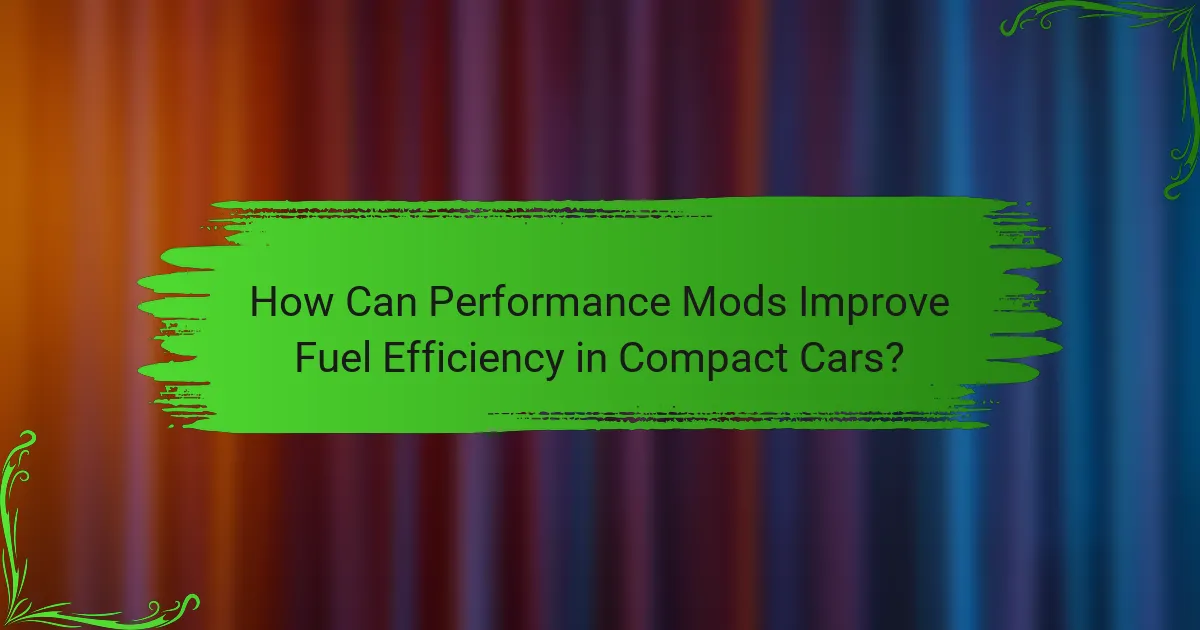Performance modifications can significantly improve fuel efficiency in compact cars and sedans by optimizing engine performance and enhancing aerodynamics. Upgrades such as cold air intakes, high-performance exhaust systems, and ECU remapping not only boost mileage but also enhance the overall driving experience. By implementing these modifications, popular models like the Toyota Corolla and Honda Civic can achieve impressive miles per gallon (MPG) ratings, making them more economical and enjoyable to drive.

How Can Performance Mods Improve Fuel Efficiency in Compact Cars?
Performance modifications can enhance fuel efficiency in compact cars by optimizing engine performance, reducing weight, and improving aerodynamics. These changes can lead to better mileage and lower fuel costs over time.
Engine tuning
Engine tuning involves adjusting the engine’s control unit to improve fuel efficiency and power output. By optimizing fuel-air mixtures and ignition timing, drivers can achieve better combustion, resulting in improved mileage. Consider using a reputable tuning service to ensure compatibility with your vehicle’s specifications.
It’s important to note that while engine tuning can enhance performance, it may void warranties or violate local emissions regulations. Always check local laws before proceeding.
Weight reduction
Reducing the weight of a compact car can significantly improve fuel efficiency. Lighter vehicles require less energy to accelerate and maintain speed, which translates to better mileage. Common methods include removing unnecessary items, replacing heavy parts with lighter alternatives, and using lightweight materials like carbon fiber.
However, be cautious not to compromise safety or structural integrity when reducing weight. Focus on non-essential components to maintain a balance between performance and safety.
Improved aerodynamics
Enhancing a car’s aerodynamics can lead to reduced drag, which improves fuel efficiency. Simple modifications such as adding a rear spoiler, lowering the vehicle, or installing a front air dam can help streamline airflow. These changes can result in noticeable gains in mileage, especially at highway speeds.
Consider using aerodynamic kits specifically designed for your car model to ensure proper fit and effectiveness. Regularly check for any loose parts that could disrupt airflow.
Tire upgrades
Upgrading to low-rolling-resistance tires can enhance fuel efficiency in compact cars. These tires are designed to minimize friction with the road, allowing for better fuel economy. When selecting tires, look for those with a high fuel efficiency rating and ensure they are properly inflated to maximize benefits.
Regular tire maintenance, including rotation and alignment, is crucial for maintaining optimal performance. Under-inflated tires can significantly decrease fuel efficiency, so check tire pressure frequently.
Fuel system enhancements
Improving the fuel system can lead to better fuel efficiency by ensuring that the engine receives the right amount of fuel at the right time. Upgrades may include installing high-performance fuel injectors or a more efficient fuel pump. These enhancements can improve combustion efficiency and overall engine performance.
Before making modifications, consult with a professional to ensure compatibility with your vehicle’s existing systems. Poorly matched components can lead to decreased performance and potential engine damage.

What Are the Best Performance Mods for Sedans?
The best performance modifications for sedans focus on enhancing engine efficiency and overall driving dynamics. Key upgrades include cold air intakes, high-performance exhaust systems, ECU remapping, and suspension upgrades, each contributing to improved fuel efficiency and driving enjoyment.
Cold air intakes
Cold air intakes improve engine performance by allowing cooler, denser air to enter the engine, which can enhance combustion efficiency. This modification typically results in a noticeable increase in horsepower and torque, often in the range of 5-15%. When considering a cold air intake, ensure compatibility with your sedan’s make and model.
Installation is generally straightforward, but it’s essential to follow the manufacturer’s guidelines to avoid potential issues. Regular maintenance, such as cleaning or replacing filters, will help maintain optimal performance.
High-performance exhaust systems
Upgrading to a high-performance exhaust system can significantly improve your sedan’s airflow, reducing back pressure and enhancing engine efficiency. This modification can lead to gains of around 5-20% in horsepower, depending on the system and vehicle. Look for systems that are designed specifically for your sedan to ensure proper fit and performance.
Consider the sound level and material quality when selecting an exhaust system. Stainless steel options tend to offer better durability and resistance to corrosion, while also providing a more aggressive sound profile.
ECU remapping
ECU remapping involves reprogramming your sedan’s engine control unit to optimize fuel delivery and ignition timing, leading to improved performance and fuel efficiency. This modification can yield a power increase of 10-30%, depending on the vehicle and the extent of the tuning. It’s advisable to have this done by a professional to ensure safety and compliance with local regulations.
Keep in mind that remapping may void your warranty or affect emissions compliance, so check local laws and consult with your dealership before proceeding.
Suspension upgrades
Suspension upgrades enhance your sedan’s handling and ride quality by replacing factory components with performance-oriented parts. Options include upgraded shocks, struts, and sway bars, which can improve cornering stability and reduce body roll. These modifications can lead to a more responsive driving experience, making your sedan feel sportier.
When upgrading suspension, consider your driving style and the type of roads you frequently navigate. A stiffer suspension may improve handling but can also result in a harsher ride, so balance performance with comfort based on your preferences.

Which Compact Cars Offer the Best Fuel Efficiency After Mods?
Compact cars like the Toyota Corolla, Honda Civic, and Ford Fiesta can achieve excellent fuel efficiency with the right performance modifications. By focusing on engine tuning, weight reduction, and aerodynamics, these vehicles can significantly enhance their miles per gallon (MPG) ratings.
Toyota Corolla
The Toyota Corolla is known for its reliability and fuel efficiency, making it a popular choice among compact cars. After modifications such as a cold air intake and a performance exhaust system, drivers can expect improvements in fuel efficiency by around 5-10 percent.
To maximize gains, consider reducing weight by removing unnecessary components or opting for lighter aftermarket parts. Regular maintenance, including keeping tires properly inflated, also plays a crucial role in maintaining optimal fuel economy.
Honda Civic
The Honda Civic is another compact car that responds well to performance mods aimed at improving fuel efficiency. Upgrades like ECU tuning and high-efficiency fuel injectors can lead to a noticeable increase in MPG, often in the range of 10-15 percent.
Additionally, enhancing aerodynamics with a front lip spoiler or side skirts can help reduce drag. Be cautious with modifications that might affect emissions compliance, as some changes could lead to regulatory issues.
Ford Fiesta
The Ford Fiesta, while smaller, can also benefit from performance modifications to boost fuel efficiency. Installing a turbocharger or upgrading the intercooler can enhance engine performance, potentially increasing fuel economy by 5-10 percent.
When modifying a Fiesta, focus on lightweight wheels and tires to improve handling and efficiency. Regularly check engine performance and emissions to ensure that modifications do not lead to excessive wear or regulatory problems.

What Are the Costs Associated with Performance Mods?
The costs associated with performance modifications can vary widely based on the type of modifications, the vehicle model, and labor expenses. Generally, you can expect to spend anywhere from a few hundred to several thousand dollars, depending on the complexity and quality of the parts and installation.
Parts and installation
Performance parts can range from simple air filters to complex turbocharger kits. Basic modifications like exhaust systems or cold air intakes may cost between $200 and $1,000, while more extensive upgrades can exceed $5,000. Installation costs can add another $100 to $1,000, depending on labor rates in your area.
When selecting parts, consider both quality and compatibility with your vehicle. Opting for reputable brands can enhance performance and reliability, reducing the likelihood of future repairs.
Maintenance considerations
Performance modifications often require more frequent maintenance. For instance, upgraded air filters may need to be cleaned or replaced more often than stock filters. Additionally, higher-performance components can lead to increased wear on the engine, necessitating regular checks and potential replacements.
It’s crucial to follow the manufacturer’s recommendations for maintenance intervals and to use high-quality fluids and parts to ensure longevity and optimal performance.
Potential savings on fuel
While performance mods can enhance driving experience, they may also improve fuel efficiency under certain conditions. For example, a well-tuned engine or a lightweight exhaust system can lead to better fuel economy, potentially saving you a few cents per gallon. However, the actual savings depend on driving habits and the specific modifications made.
Keep in mind that aggressive driving or modifications aimed primarily at performance may negate any fuel savings. Balancing performance upgrades with fuel efficiency goals is essential for maximizing benefits.

How Do Performance Mods Affect Vehicle Warranty?
Performance modifications can potentially void or alter your vehicle’s warranty. It’s crucial to understand how these changes might affect coverage before making any upgrades.
Warranty implications
When you modify your vehicle for performance, the manufacturer may claim that any resulting issues are due to those modifications, which could void your warranty. It’s essential to check the warranty terms, as some manufacturers have specific clauses regarding aftermarket parts.
For example, if you install a high-performance exhaust system and later experience engine problems, the manufacturer might deny warranty claims related to the engine, arguing that the modification caused the issue. Always document any modifications and keep receipts to support your case if disputes arise.
To mitigate risks, consider modifications that are less likely to affect warranty coverage, such as aesthetic upgrades or those that comply with manufacturer specifications. Consulting with your dealer before making significant changes can provide clarity on what is permissible without jeopardizing your warranty.
